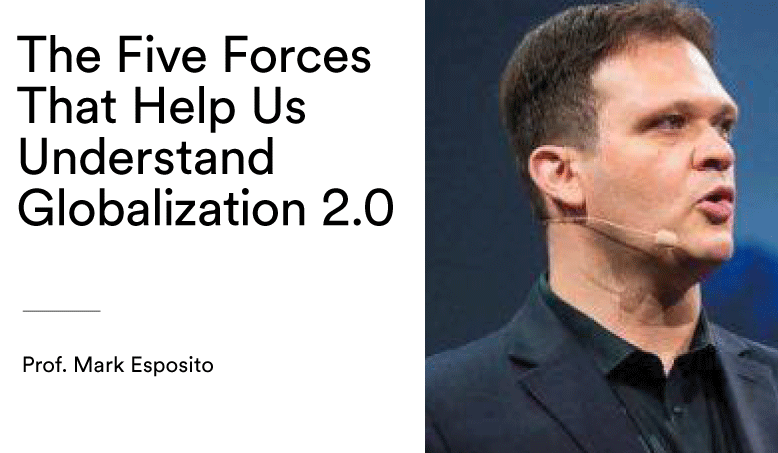Right now we are living through one of the most significant decades in history, as we move from one set of industrial policies— which saw parts of the world lifted from poverty, combined with the rise of tech and the internet—to another. Globalization 2.0.
The relationship between humans and machines is moving into a cognitive era
Transformation is taking place right across the board, impacting everything from economics to society and geopolitics. At the same time, our global system is becoming more fragile. Even before the global pandemic, this system was under immense pressure, however, COVID-19 was the tipping point which proved that our resilience was not as we thought.
The cognitive era
Crucially, the relationship between humans and machines is moving into a cognitive era, in which technology is shaped around the brain and the brain shapes technology. The brain will be the largest form of feedback for conceptual models which will inspire algorithms, as well as the deep tech that will follow once we shift to frontier technologies, quantum computing, and advanced cloud.
Technology will also shape geopolitics globally: something we already see in the race between the US and China, based around surveillance tech and AI rather than just trade.
We will certainly deal with many problems we’ve never seen before as there is simply no precedent. So what does this mean for how we navigate the next decade of profound transformation as leaders?
In particular, the pandemic democratized tech and data for SMEs making it possible for smaller companies to be part of global economies
The 5Cs of Globalization 2.0
In the forthcoming book The Great Remobilization (which I co-authored with fellow Hult professors Olaf Groth in San Francisco and Terence Tse in London) we suggest it is helpful to grips with the operating system of Globalization 2.0 – the 5Cs. These five forces mean something to all of us and can provide perspective on where the reconstruction of the world is moving at a macro level.
Through understanding this, we can chart the implications of these forces and redesign global strategies and systems to remobilize toward a smarter, more resilient, and equitable future:
Covid-19 was truly an accelerant – changing the internet and our ability to deal with it. In particular, the pandemic democratized tech and data for SMEs making it possible for smaller companies to be part of global economies and empowering millions of people to become micro-entrepreneurs. In the aftermath of the pandemic, we see the rise of the Web3 proposition, with developments such as the Metaverse, Blockchain, and crypto-currency leading us toward a digital world where everyone will be connected via decentralized networks. Fundamentally Web3 should enable users to own and manage their data and other technological assets.
We are seeing the implications of climate change on a global scale: not just rising temperatures but rethinking entire economies and human geography with an understanding of climate.
Crypto is reshaping the concept of finance. It has shifted the agenda from concentration around traditional financial institutions to diffusion, from convergence to divergence. There are obvious dangers here, which is why I am a firm believer that regulation of this technology is critical. Just as global pharmaceutical companies are regulated, crypto should have the same levels of governance, which requires yet unseen levels of engagement from both tech companies and governments.
Cyber security is critical as we move into a digital structure where money is nothing more than transactions between 0s and 1s. Although hacking has happened for years in elections and wars, this is not just about countries—rather the hacking of banks, databases, medical research, and patterns. While we are dependent on tech for the creation of value, we are also dependent on tech for securing this value.
Seven out of the 10 largest construction companies are from China, while 20 of the largest tech companies are Chinese. This system – running in contention with the Western world – simply cannot be ignored.
Climate change. We are seeing the implications of climate change on a global scale: not just rising temperatures but rethinking entire economies and human geography with an understanding of climate. Sadly, we are almost at a point where climate change is irreversible, so we must understand and adapt to volatility and large-scale disruptive events. No country will remain competitive without addressing the mitigation necessary for the climate.
China is no longer just a country but an entire system of reference for an alternative method of growth. For example, the Asian Infrastructure Investment Bank (AIIB) was the first of its kind to challenge the mission of the World Bank, which has been around since 1944. China has initiated the most ambitious infrastructure project of humankind, shifting infrastructure from Shanghai to Lisbon, through the Middle East, cutting corridors through Pakistan on the way to the Indian Ocean, and also reshaping Africa. Seven out of the 10 largest construction companies are from China, while 20 of the largest tech companies are Chinese. This system – running in contention with the Western world – simply cannot be ignored.
Design Activist leaders can…create new inclusive visions, redefine growth beyond money, and experiment to create shared facts and experiences.
The opportunity to become ‘Design Activist Leaders’
All of this may sound dystopian and frightening; however, there is an opportunity here for leaders—armed with this knowledge of the 5Cs—to become ‘Design Activists.’ People who can rethink the architecture of the world and the way we see it.
Design Activist leaders are at once intellectual-analytical and also empathically tolerant of diverse interpretations of truth and fact. They can employ Zeroth’s principle of thinking, create new inclusive visions, redefine growth beyond money, and experiment to create shared facts and experiences.
All of this is to rebuild the trust that allows us to explore new horizons for human and economic growth, in this Globalization 2.0 era.


